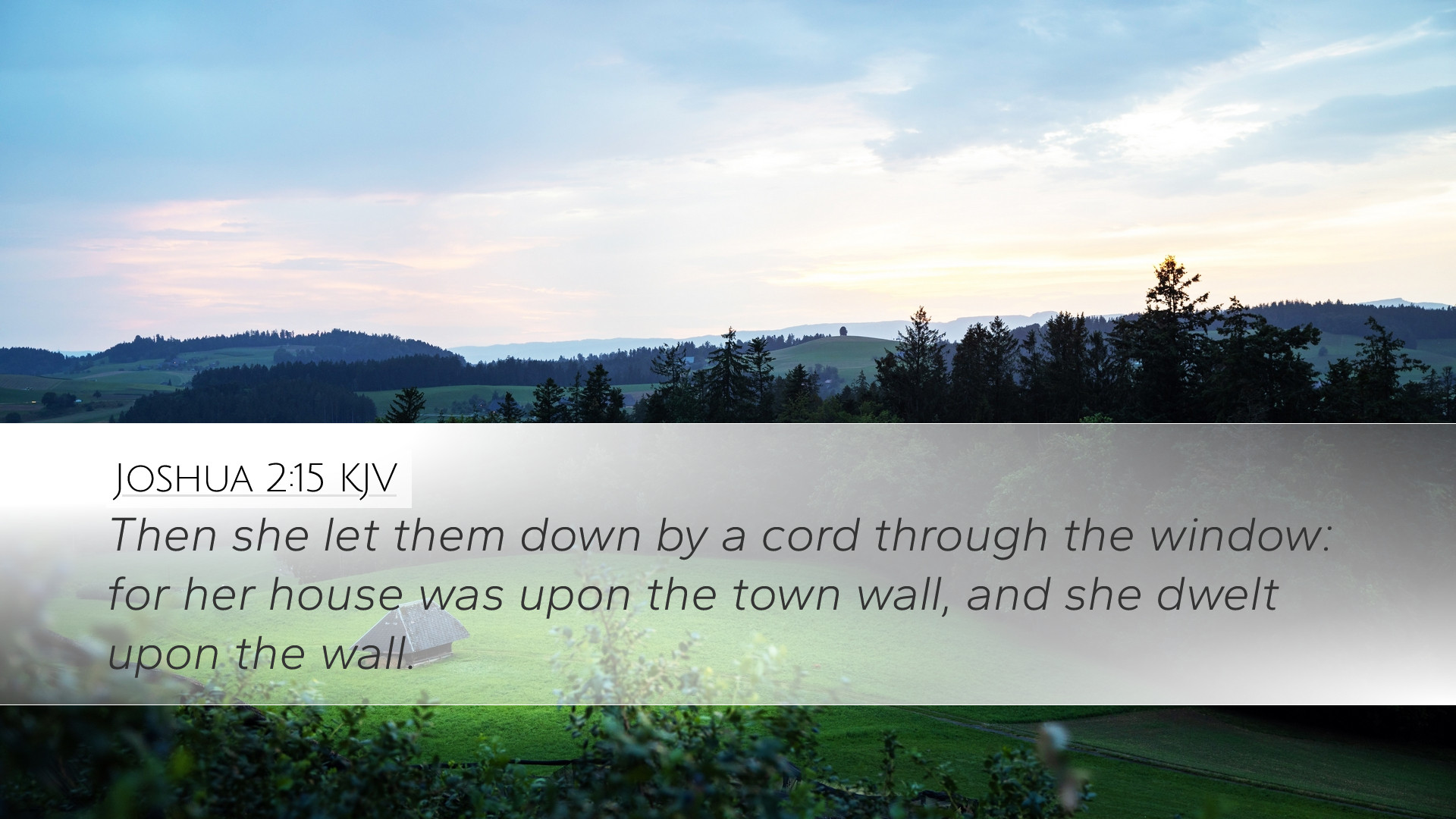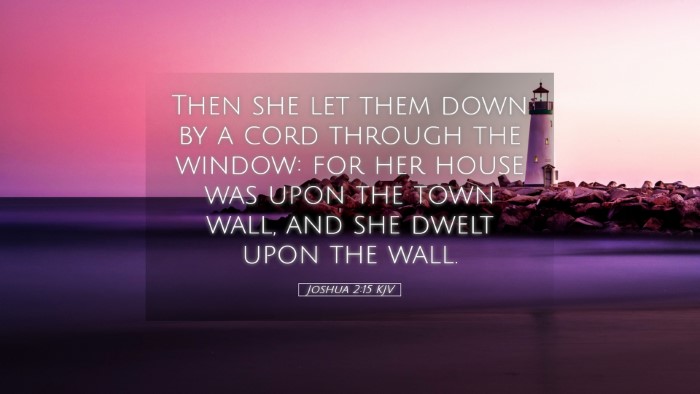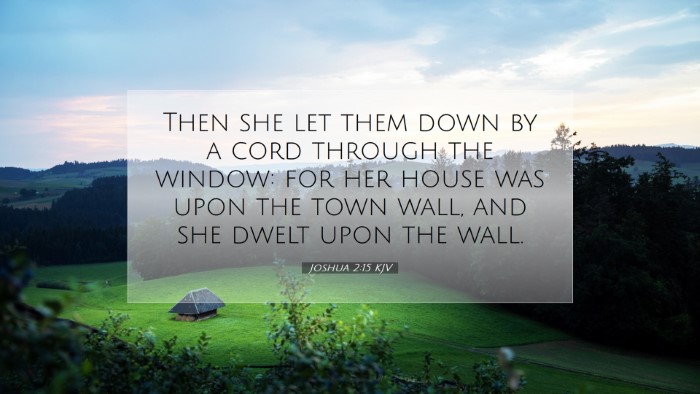Old Testament
Genesis Exodus Leviticus Numbers Deuteronomy Joshua Judges Ruth 1 Samuel 2 Samuel 1 Kings 2 Kings 1 Chronicles 2 Chronicles Ezra Nehemiah Esther Job Psalms Proverbs Ecclesiastes Song of Solomon Isaiah Jeremiah Lamentations Ezekiel Daniel Hosea Joel Amos Obadiah Jonah Micah Nahum Habakkuk Zephaniah Haggai Zechariah MalachiJoshua 2:15
Joshua 2:15 KJV
Then she let them down by a cord through the window: for her house was upon the town wall, and she dwelt upon the wall.
Joshua 2:15 Bible Commentary
Commentary on Joshua 2:15
Verse Reference: Joshua 2:15 - "Then she let them down by a rope through the window: for her house was upon the town wall, and she dwelt upon the wall."
Introduction
The narrative of Rahab in Joshua 2 presents a unique intersection of faith, bravery, and divine providence. In this verse, we observe the practical act of lowering the Israelite spies from her window, signifying both her commitment to their cause and her faith in the God of Israel. This act not only highlights the physical peril involved but also signifies a deeper theological and ethical dimension pertinent for pastors, students, and scholars alike.
Contextual Background
Understanding the context is pivotal. The Israelites stand on the verge of entering the Promised Land, having been given charge to conquer Jericho—a stronghold beset with walls that reflect both the literal and metaphorical barriers between them and their inheritance. The spies sent to survey the city align with God’s strategic and providential workings throughout Israel's journey. Rahab, a Canaanite harlot, unexpectedly becomes an essential figure in this divine plan.
Exegesis of Joshua 2:15
The Act of Lowering
Rahab's decision to let the spies down via a rope through her window denotes a profound act of risk-taking and loyalty. Commentary by Matthew Henry suggests that this act symbolizes her faith in the promises of the God of Israel. Rahab's faith stands in stark contrast to the fear that gripped the citizens of Jericho, highlighting an essential biblical theme—that faith often defies societal norms and expectations.
The Window and Wall Context
The detailed description of the spies being let down through a window illustrates the precariousness of their situation. Albert Barnes notes that Rahab’s house being situated on the wall provides both a strategic advantage and a microcosm of Israel’s impending victory. The wall itself, often seen as an emblem of strength, becomes a symbol of the barriers that God will break down for His people. The imagery of high walls analogously represents the sin and opposition that stands in the way of God’s redemptive work.
Theological Insights
Faith and Action
The synergy of faith and works is illustrated through Rahab's decisive action in the face of danger. Adam Clarke emphasizes that faith without action is dead; Rahab's willingness to risk her life aligns with the New Testament teaching that true faith manifests in tangible works. Her readiness to act is a model for believers today, demonstrating that faith often calls for courageous steps, particularly when the stakes are high.
God’s Sovereign Plan
This narrative also underscores God’s sovereignty in using unlikely instruments for His purposes. Rahab, despite her sinful background, becomes instrumental in the fulfillment of God's promise to Israel, affirming the biblical truth that no one is beyond the redemption offered by God. Matthew Henry articulates that this paints a broader picture of grace—indicating that God’s selection of leaders and heroes often defies human expectations.
Rahab as a Typological Figure
Foreshadowing Redemption
Rahab serves indeed as a type of salvation amid judgment; her actions prefigure the redemptive work found in Christ. Albert Barnes notes that just as Rahab's faith in the God of Israel led to her deliverance, so too does faith in Christ lead to salvation. Her story is a powerful reminder that God's mercy extends beyond the borders of Israel, as seen in the genealogical inclusion of Rahab in the lineage of Jesus (Matthew 1:5).
Lessons for Today
For pastors, theologians, and students, the passage offers numerous lessons:
- Courageous Faith: Admonition to adopt a courageous faith that prompts action in God's directives, regardless of societal pressure.
- God’s Redemption: God’s ability to redeem and use individuals from any background reflects His grace; no one is disqualified from God’s purposes.
- The Importance of Action: The principle of faith actively moving us to obedience and witness, embracing the risks involved in serving God.
Conclusion
In summation, Joshua 2:15 is rich with implications for contemporary believers. It reveals essential truths about faith in action, the transformative power of God’s grace, and the instrumental role each believer can play in God's unfolding narrative. As we reflect upon Rahab’s story, may we be encouraged to embrace our calling, stepping out with faith and courage, just as she did.


